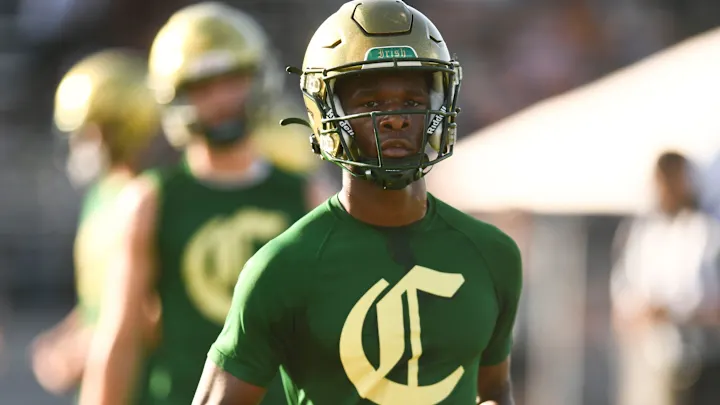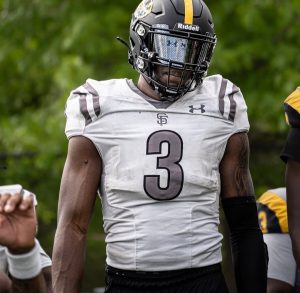
In the ever-unpredictable world of college football recruiting, decisions are rarely final until pen meets paper on National Signing Day. But for one of the top running back prospects in the nation, the race is effectively over. Four-star running back Malik Anderson, a top 2025 prospect out of Buford, Georgia, has committed to Notre Dame, canceling his much-anticipated official visit to Tennessee, a program that had been recruiting him heavily for over a year.
The announcement, made via a carefully curated video on his social media accounts, sent shockwaves through both fan bases. For Tennessee, it marked a significant recruiting blow in an offseason otherwise full of momentum. For Notre Dame, it signaled a major recruiting victory in a cycle where the Fighting Irish are aggressively targeting offensive skill talent.
Anderson’s decision, while somewhat surprising in timing, reflects a larger trend developing in the recruitment of top-tier athletes: players are committing earlier, and fewer are entertaining multiple official visits once they make up their minds. For Tennessee fans hoping that Anderson would keep the door open, those hopes were dashed when he officially canceled his visit to Knoxville just hours after going public with his commitment to Marcus Freeman’s program.
Ranked as the No. 6 running back in the nation and the No. 56 overall player in the 247Sports Composite Rankings, Anderson is the kind of athlete who changes offenses. At 5-foot-11, 200 pounds, he combines explosive speed with rare balance and vision. During his junior season, he rushed for 1,702 yards and 23 touchdowns, adding another 412 yards receiving as a dual-threat weapon.
His offer list reads like a who’s who of college football’s elite: Georgia, Alabama, Ohio State, Texas, Michigan, and USC were all in pursuit. But by late spring, the battle had narrowed to three: Tennessee, Notre Dame, and Florida State.
Tennessee had hosted Anderson multiple times in unofficial capacities and had been considered the frontrunner throughout the fall and winter of 2024. Running backs coach Jerry Mack had developed a strong relationship with Anderson and his family, while head coach Josh Heupel’s explosive, high-tempo offense intrigued Anderson with its ability to showcase running backs in both the ground game and passing attack.
However, Notre Dame’s consistent messaging, strong academic profile, and rising on-field credibility under Freeman’s leadership ultimately won out.
According to sources close to the recruitment, several factors contributed to Anderson’s decision to choose the Fighting Irish over the Vols.
1. Player Development Track Record
Notre Dame’s reputation for developing offensive linemen and running backs stood out. Over the past decade, the Irish have produced NFL-caliber backs like Kyren Williams, Josh Adams, and C.J. Prosise, all of whom thrived behind elite offensive lines. Anderson and his family reportedly emphasized long-term development and preparation for the NFL, not just short-term production.
2. Academic and Cultural Fit
Notre Dame’s academic prestige played a meaningful role in Anderson’s decision, particularly with his mother, who works in education. The family made multiple trips to South Bend, and those visits left a lasting impression. While Tennessee boasts strong academics as well, the holistic package offered by Notre Dame — including life after football — resonated deeply.
3. Marcus Freeman’s Influence
Freeman, still one of the youngest head coaches in college football, continues to establish himself as one of the sport’s most persuasive recruiters. His relatability, honesty, and vision for the program have been key in landing blue-chip talent. Anderson noted Freeman’s direct involvement in his recruitment, which helped make him feel like a priority.
4. Early Opportunity
With Notre Dame’s current depth chart looking favorable for early playing time in 2025, Anderson saw a clear path to significant snaps. While Tennessee has a talented backfield, including young stars like Cameron Seldon and Peyton Lewis, Notre Dame’s roster offers less congestion at the position.
For Tennessee, Anderson’s decision to commit elsewhere stings for several reasons.
First, it underscores the volatility of recruiting even when a school leads for months. Tennessee had built significant momentum with Anderson, hosting him for two Junior Days and multiple spring visits. He was expected to attend the Vols’ “865 Live” event in June, a premier recruiting weekend for the program. That visit, however, is now canceled, leaving Tennessee to pivot quickly.
Second, Anderson’s departure from their target list heightens the pressure to secure other running backs in the 2025 class. The Vols are still in the mix for prospects like Jamarion Parker (MO), Jaden Knight (FL), and Tyree Johnson (TX), but Anderson was viewed as their top priority. Tennessee may now intensify efforts to flip a committed back or push harder for under-the-radar prospects.
Lastly, the optics of losing a top recruit to a fellow powerhouse like Notre Dame — especially after long being perceived as the leader — creates a narrative challenge for Tennessee’s staff. Fair or not, questions will be raised about the ability to close on elite offensive talent, a perception Josh Heupel and his staff have worked hard to overcome with recent wins in recruiting.
For Notre Dame, Anderson’s commitment represents more than just an individual win. It’s another data point in a trend that shows Freeman elevating the program’s recruiting ceiling.
With Anderson on board, Notre Dame now boasts commitments from two of the nation’s top 100 players, joining five-star offensive lineman Michael Terry from Texas. They also remain in strong position for several other elite targets, including five-star WR Javon Carter, top-50 DE Elijah Barnes, and four-star QB Luke McCutcheon.
Anderson’s commitment also reinforces the idea that Notre Dame can successfully battle SEC powers for top offensive skill talent, something critics doubted as recently as two years ago. Freeman’s ability to blend Notre Dame’s traditional values with a modern, aggressive recruiting approach is paying off in tangible ways.
Notre Dame Fans: Ecstatic and Energized
Within minutes of Anderson’s announcement, Notre Dame social media lit up with celebration. Message boards and Twitter/X feeds filled with hype, and recruiting analysts hailed it as a major win for Freeman. The excitement isn’t just about the talent; it’s also about what the commitment signals. Notre Dame is no longer settling for top-150 guys — they’re actively flipping and beating SEC schools for top-50 prospects.
Tennessee Fans: Disappointed but Resilient
On the other side, Tennessee fans expressed frustration, though not necessarily surprise. Anderson had gone radio silent over the past week — a common sign that a decision is imminent — and insiders had hinted at growing Notre Dame momentum. While disappointed, Vol fans were quick to rally behind the staff and point out past recruiting wins. Many noted that Tennessee still holds commitments from other top 2025 players and that recruiting cycles are long and often unpredictable.
Losing Anderson may sting, but the Vols aren’t out of options. In fact, it may open the door to a few new strategies:
1. Double Down on Plan B Prospects
Tennessee has already hosted several other running backs who are either uncommitted or wavering in their pledges. Look for the staff to increase communication with players like Tyree Johnson and Florida’s Darion Allen, a fast-rising three-star who’s picking up Power Five interest.
2. Consider the Portal
The transfer portal has become a viable tool for filling roster gaps quickly. If Tennessee can’t land another top-tier prep back in the 2025 class, don’t be surprised if they target a proven back in the portal next spring to round out the room.
3. Use This as Motivation
Tennessee’s staff under Heupel has done an excellent job turning recruiting losses into fuel. After missing on five-star WR Carnell Tate in 2023, they responded by landing elite wideouts in the next cycle and elevating their offensive game. The same could happen here.
Malik Anderson’s decision to commit to Notre Dame and cancel his official visit to Tennessee is a clear example of how quickly things can change in college football recruiting. For the Vols, it’s a tough loss, especially after months of leading for his services. For Notre Dame, it’s a signature victory that boosts their 2025 class and reinforces their upward trajectory under Marcus Freeman.
Anderson’s commitment sends a message to other top recruits: Notre Dame isn’t just a contender — it’s a destination. And for Tennessee, the message is clear too: adapt, reload, and stay aggressive, because in the cutthroat world of college football recruiting, there’s never time to dwell — only to prepare for the next opportunity.





